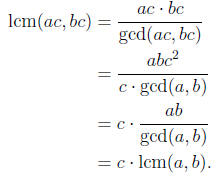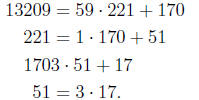Number Theory Homework 4 Solution
1. Given three integers a, b, c with c > 0, prove that lcm(ac, bc) = c ·
lcm(a, b).
Solution:

2. Use the Euclidean algorithm to compute lcm(357,−629, 221).
Solution: Since lcm(357,−629, 221) = lcm(lcm(357,−629), 221), we’ll first
compute
lcm(357,−629) = lcm(357, 629). Using the Euclidean algorithm,

So gcd(357, 629) = 17, and thus lcm(357, 629) =
 = 13209. Next, we calculate
= 13209. Next, we calculate
lcm(13209, 221). Again, using the Euclidean algoirthm,

Therefore, gcd(13209, 221) = 17, and hence lcm(13209, 221) =
 = 171717
= 171717
3. For any integer n, show that lcm(9n + 8, 6n + 5) = 54n^2 + 93n + 40.
Solution: For any integer n, we can write 1 = 2(9n + 8) − 3(6n + 5). This tells
us
gcd(9n + 8, 6n + 5) = 1. So

4. (a) Use the Fundamental Theorem of Arithmetic to prove that gcd(an, bn) = (gcd(a,
b))n for
any positive integer n. If particular, if a and b are relatively prime, then so
are an and
bn.
Proof. By TFA, we can write
 where
where  are
distinct
are
distinct
primes and  . Let
. Let for all i. Then
for all i. Then  , and
, and
so 
On the other hand, 
Note that for each i,  =
=
 =
=  Therefore,
Therefore, 

(b) If  divides
divides
 , must a divide b? Explain your answer.
, must a divide b? Explain your answer.
Solution: Yes. If  , then
, then
 From part (a), we know
From part (a), we know
 =
=
 . Combining, we get gcd(a, b) = a, and
therefore a|b.
. Combining, we get gcd(a, b) = a, and
therefore a|b.
5. Without using the Euclidean algorithm, find the
greatest common divisor and least common
multiple of a =  and b =
and b = .
You may leave your answer
.
You may leave your answer
in factored form.
Solution: gcd(a, b) =  and lcm(a, b) =
and lcm(a, b) = 
6. Without quoting Dirichlet’s Theorem, prove that there
are infinitely many primes of the form
6k − 1.
Proof. First note that by the division algorithm, every
odd prime greater than 3 is of the
form 6k + 1 or 6k + 5. Since 6k + 5 = 6(k + 1) − 1, it is true that every odd
prime is of the
form 6k + 1 or 6k − 1.
Now suppose that there are finitely many primes of the
form 6k−1, say  Consider
Consider
the number N =  − 1. Since N is of the form
6k − 1 and
− 1. Since N is of the form
6k − 1 and  for all i, N is an
for all i, N is an
odd composite integer and so must have prime factors of the form 6k + 1 or 6k −
1.
Note that the product of two numbers of the form 6k + 1 is
again of that form. Thus, N
has a prime divisor of the form 6k −1, i.e.  for some j. But this means
for some j. But this means  , impossible.
, impossible.
Hence, there are infinitely many primes of the form 6k − 1.

